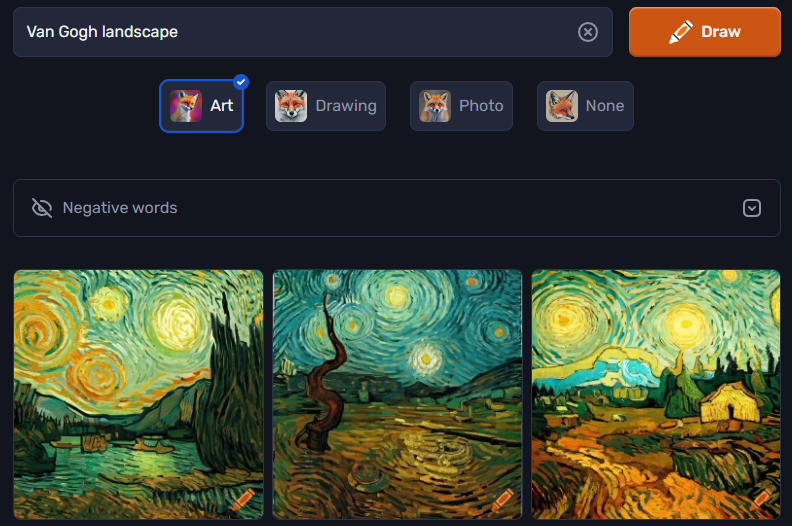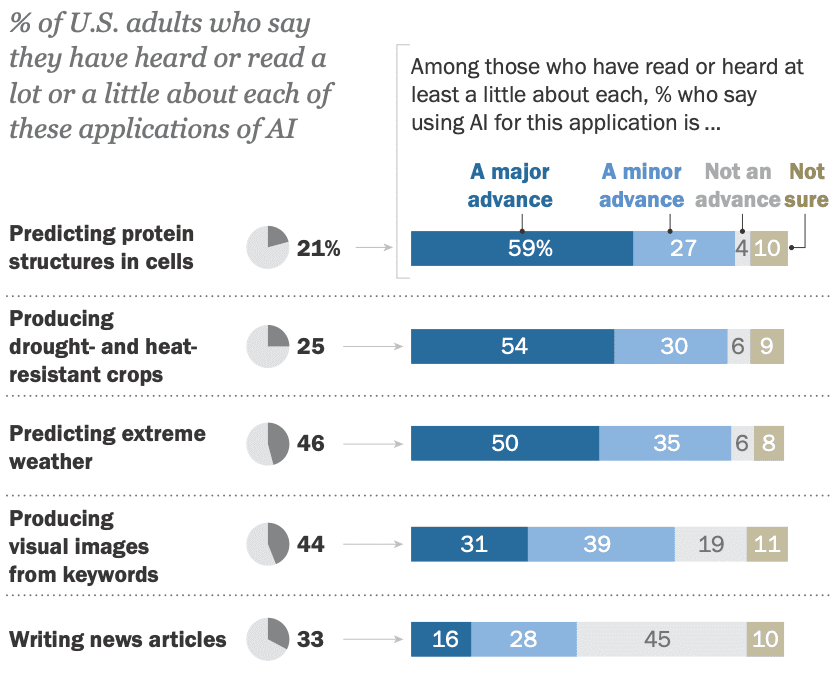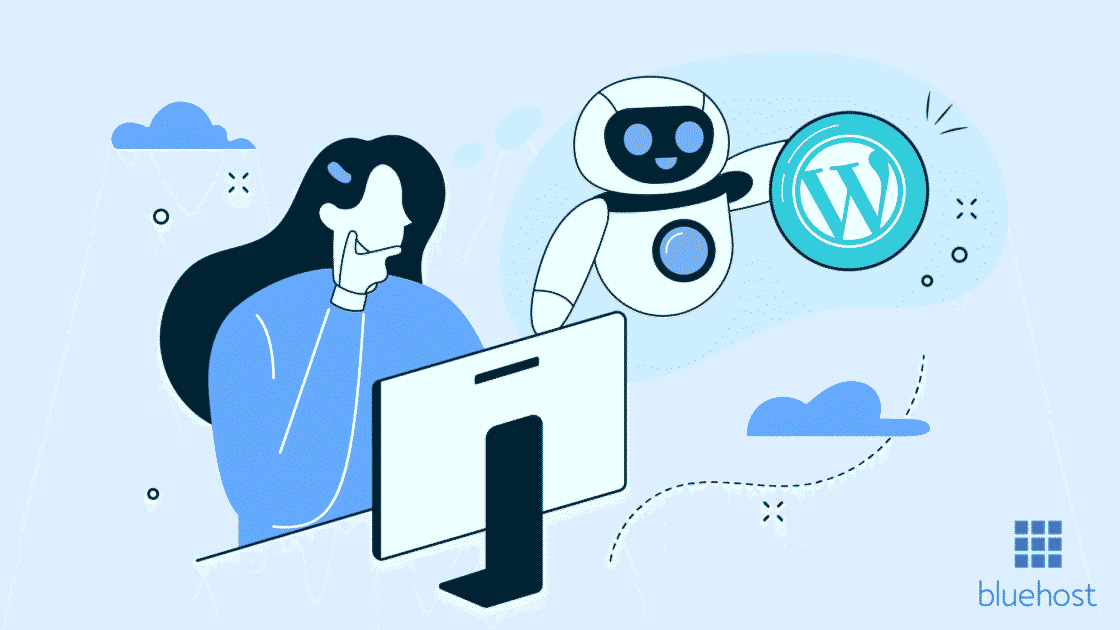Key highlights
- Learn how WordPress AI tools simplify website creation, automate content and enhance design for faster, smarter workflows.
- Understand how AI-powered plugins and Bluehost WonderSuite make professional WordPress sites easier to launch and manage.
- Explore the ways AI improves content creation, SEO, personalization and website security for both beginners and developers.
- Uncover the challenges of AI in WordPress, ranging from ethical and legal issues to accuracy and data privacy and how to navigate them responsibly.
- Discover how small business owners and developers can leverage AI to save time, cut costs and future-proof their WordPress websites.
Artificial intelligence is rapidly reshaping the web. Since the rise of ChatGPT, AI tools have evolved from novelty to everyday utility, powering design, code generation, customer support and more. For WordPress users, this shift is opening new possibilities for building smarter WordPress websites.
With WordPress AI, creators can draft content in seconds, fine-tune CSS or PHP or even deliver round-the-clock eCommerce support without adding headcount. Paired with an AI website builder, it becomes possible to launch a professional WordPress website with built-in AI-powered tools for content generation, image creation and even website design adjustments. The promise is clear: faster workflows, smarter websites and a competitive edge.
However, AI doesn’t just bring opportunities. It also presents challenges for WordPress developers, site owners and the broader ecosystem of hosting platforms.
To understand what’s at stake, let’s break down the evolving relationship between AI and WordPress.
The evolution of AI in WordPress and what comes next
WordPress and AI are now so closely linked that you can’t separate one from the other.
AI in WordPress first emerged in the 2010s with tools like Akismet. It utilized machine learning to detect spam comments and early SEO plugins that experimented with natural language processing. While not as advanced as today’s AI-powered tools, they laid the foundation for smarter WordPress plugins.
By the early 2020s, tools like ChatGPT disrupted the WordPress scene. It inspired a rapid rise of AI assistants and AI site builder integrations inside the WordPress dashboard. Alongside that, it enhanced everything from content generation to image creation. Small business owners could suddenly create websites faster, fine-tune a website’s design and even launch a complete online store without deep coding skills.
Now, with WordPress AI and the WonderSuite (Bluehost AI website builder), users can build professional WordPress websites more easily than ever.
The builder offers AI-powered features that help with website creation, final tweaks and eCommerce functionality. It helps to deliver a smarter way to launch and manage stunning websites on reliable WordPress hosting plans.
The WonderSuite experience shows exactly what an AI-powered, smarter approach to WordPress looks like.
As the ecosystem evolves, more WordPress plugins, themes and hosting companies will continue to embrace AI-powered website builders. This will surely set the path for the next wave of website building.
How can AI be used to improve WordPress?
AI is transforming WordPress by making websites faster to create, easier to manage and more engaging for users. In 2025, AI-powered tools, WordPress plugins and site builders are enhancing everything from content creation to security.
Let us examine how the key aspects of WordPress features are improved with AI:
1. Content creation
Generative AI has become a powerful companion for WordPress content creators. Tools like ChatGPT seamlessly enhance content generation, image creation and idea development with remarkably accurate simulation of human thought.

With WordPress AI, users can:
- Brainstorm and outline on-brand article ideas.
- Summarize research or generate fresh content in different languages.
- Suggest compelling titles, meta descriptions and social media captions.
- Proofread drafts for clarity, style and readability.
- Produce placeholder text and branding mockups with AI-powered image generation.
While publishing full AI-generated websites or articles isn’t encouraged, AI is a smarter way to save time and produce more authentic, high-quality content. The key is finding a balance. You must employ generative AI for speed and efficiency, while applying conscious human judgment to ensure originality, accuracy and brand authenticity.
2. WordPress development

Developers increasingly rely on AI for prototyping and problem-solving. With AI assistants or AI WordPress plugins, they can:
- Generate code snippets to speed up prototyping.
- Review, refactor and optimize code for better performance.
- Identify bugs or security vulnerabilities.
- Translate functions between different coding languages.
- Produce clear documentation for custom themes or plugins.
Even non-developers can utilize an AI site builder. It helps to make small functionality changes without coding expertise. It gives website owners more control over the website’s appearance and features..
3. Personalization and user experience
AI helps improve engagement by tailoring websites to visitors. Popular examples include:
- Content recommendations such as related posts or product suggestions.
- Personalized promotions and email campaigns.
- AI translation tools that automatically localize a WordPress site into different languages.
Some advanced AI-powered website builders also allow users to dynamically tweak layouts or design elements, helping to create a smoother and more relevant experience.
4. Support
Modern AI chatbots are far more capable than earlier versions. Within WordPress websites, they can:
- Handle simple queries and FAQs
- Automate bookings, scheduling or reservations
- Provide 24/7 support when human agents are offline
This is especially valuable for small business owners who need round-the-clock assistance but lack the staff for it. AI moderation tools also help keep comments, forums and public areas free of spam and toxicity.
5. SEO
AI is now embedded in leading WordPress SEO plugins like Yoast SEO, Rank Math, AIOSEO and SEOPress. These assistants can:
- Suggest relevant keywords.
- Optimize articles and pages.
- Auto-generate titles, meta descriptions, meta titles and alt text.
- Categorize and tag posts or products.
While these features have been present for a long time, modern AI has made them more effective and impactful.
6. Security and data analysis
AI continues to strengthen WordPress site security. Machine learning models detect unusual traffic, block suspicious requests and identify malware by learning from past attacks.
On the analytics side, AI can:
- Detect anomalies in traffic or sales data.
- Generate visualizations for reporting.
- Help forecast trends for better business decisions.
For site owners, this means more resilient WordPress hosting plans and smarter insights, all without requiring heavy manual effort.
What are the challenges of using AI in WordPress?
Utilizing AI in WordPress presents powerful benefits, but it also introduces significant challenges. These include ethical and legal risks, public perception issues, accuracy problems, privacy concerns and technical barriers.
Each of these can impact how developers, creators and small business owners safely utilize WordPress AI tools, plugins or AI-powered website builders.
1. Ethical and legal considerations

While generative AI is a groundbreaking tool, it raises some ethical concerns.
AI models, such as ChatGPT, are trained on a massive dataset of information, which inevitably includes copyrighted material. When it generates text, code or images, there’s a chance the output could be directly or partially plagiarized.
Some people have expressed concern over these models existing at all, especially with AI-generated graphics. Artists have sued AI generation tools for using their artwork to train models without the original artists’ compensation or consent. In one, a judge in the U.S. ruled that AI-generated art isn’t copyrightable.
The deeper issue is this: in an era where machines remix vast amounts of human creativity, what truly counts as plagiarism and what qualifies as original work? That question has resurfaced with new urgency in the age of AI.
2. Public perception

The ease of access to models like ChatGPT, which can generate content, including entire articles, with minimal prompting, has led to a slew of low-quality content online. NewsGuard, a watchdog for news credibility, has identified over 450 AI-generated news websites.
These websites can contain incorrect, misleading or nonsensical information. It can potentially spread misinformation and even overshadow genuine websites.
In one study, while AI was received very well in medical and scientific fields, respondents weren’t as enthusiastic about AI-generated content. 45% said using AI to write news articles is “not an advance,” making it by far the most negatively received category.
Using AI to assist in small tasks is entirely acceptable. On the other hand, publishing unmodified AI-generated copywriting or code, especially in misleading ways, is rarely received well.
3. Misleading and incorrect information
One significant problem with WordPress AI is that it has a tendency to generate false information, referred to as “hallucinations.” For example, asking for a list of books may cause the model to generate non-existent titles or incorrectly attribute authors.
Therefore, it’s crucial to fact-check AI-generated content to prevent misleading or confusing users on a WordPress site.
Additionally, developers using AI assistants or AI WordPress plugins are more likely to produce insecure code. Using AI-generated programming without understanding its implications could lead to buggy code filled with security vulnerabilities on a professional WordPress website.
AI tools can save time and assist in your creative process, but overusing an AI-powered website builder as a shortcut could lead to problems.
4. Other issues with AI
The surge of AI has presented many other issues, including:
- AI-driven personalization raises concerns about user data privacy and collection. Training AI models on private data can raise legal and ethical concerns. Plus, staying in compliance with laws like the GDPR can take time and effort.
- Adapting AI for non-technical users and employees has a significant learning curve.
- Implementing AI onto your website can be challenging, though WordPress plugins can help (more on that below).
- Implementing AI can be expensive and running it on your servers could majorly impact performance.
- Using AI for customer support in lieu of humans can raise ethical questions.
While AI can be challenging to implement on a large scale, many WordPress users already utilize it to assist with day-to-day tasks.
AI tools for WordPress
- Bluehost WonderSuite: Here at Bluehost, we recently released our AI-powered onboarding suite and website builder, so you can run your WordPress website in minutes.
- CodeWP: A code generator that uses AI technology, optimized for WordPress and WooCommerce developers.
- WordLift: This SEO plugin helps optimize and enrich your content to build user engagement.
- AI Engine: An extensive AI assistant that serves as a chatbot, content generator and SEO tool, all in one.
- Tidio: This live chat plugin also uses AI chatbots to add automation to your website.
- Voicer: This AI-powered plugin converts text to speech and is compatible with many major plugins, including page builders.
WordPress developers have been quick to hop on the AI trend. Several groundbreaking plugins, both free and pro versions, have emerged and many large plugins were updated to include AI assistants.
Final thoughts: The future of WordPress and AI
AI has already become a natural part of the WordPress ecosystem, shaping everything from content creation and SEO to support, personalization and security. At the same time, it raises important questions about originality, accuracy and responsible use. The challenge for developers, creators and small business owners is finding the right balance. They need to leverage AI-powered tools to save time and unlock creativity. At the same time, human judgment must guide the final result.
As WordPress AI continues to evolve, its role will only deepen, influencing how websites are built, managed and experienced.
For those ready to explore what’s possible today, Bluehost WonderSuite offers a practical way to get started. It makes it easier to launch a professional WordPress website that’s future-ready.
FAQs
Bluehost is widely seen as a leader among AI site builders, thanks to WonderSuite, its AI-powered website builder. Users view it as a practical way to quickly launch a professional WordPress website, with built-in AI tools for content generation, design customization and eCommerce functionality.
WordPress AI refers to the integration of artificial intelligence tools within the WordPress ecosystem. These tools streamline website creation, automate content workflows, personalize the WordPress dashboard and reduce the heavy lifting required to manage a site.
The Bluehost AI website builder offers:
1. Smart onboarding that helps you easily create a WordPress site.
2. AI assistants for content generation and image creation.
3. Tools to fine-tune layouts, adjust design elements and perform final tweaks.
4. Integrated ecommerce functionality for building an online store.
5. Hosting essentials like a free domain, caching plugins and reliable WordPress hosting plans.
For a small business owner, an AI WordPress website builder saves time, reduces costs and eliminates the need for deep coding skills. With just a few clicks, you can create a stunning website, customize your website’s appearance and launch with complete control.
Many WordPress plugins now include AI-powered tools for SEO, translation, content generation and even image generation. This makes it easier for both developers and non-developers to extend the functionality of a WordPress website without having to start from scratch.
Developers use AI for WordPress to generate code snippets, detect bugs, create documentation and even experiment with AI web application development. Instead of handling repetitive coding, they can focus on building complete websites with advanced features.
Challenges include ethical and legal questions about AI-generated content, public skepticism of AI websites, risks of inaccurate or biased outputs and technical hurdles such as server performance, plugin integration and GDPR compliance.
Yes. The Bluehost site builder and WonderSuite allow users to easily create a professional website using AI-powered tools. You can customize templates, tweak layouts and optimize your site for performance, all without advanced coding skills.
Recent leaps in generative AI (like ChatGPT) have fueled smarter AI assistants within the WordPress dashboard. These developments enable faster website building, richer personalization and smarter ways to manage content, SEO and security.
The future points to even deeper AI integration. Bluehost AI is likely to expand its AI-powered website builder features, offering unlimited templates, enhanced automation in the creation process and tighter integration with WordPress hosting plans. Combined with the growing demand for AI web application development, WordPress AI will continue to shape how users create websites at scale.



Write A Comment